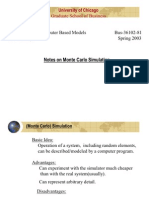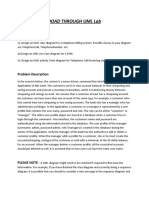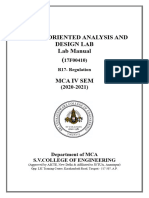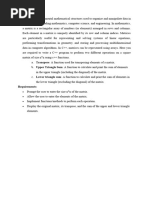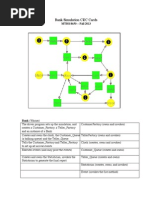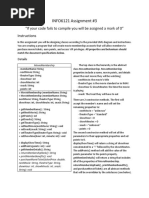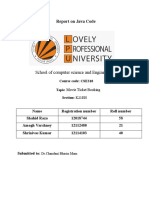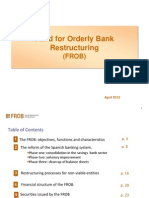Fig. 1. Class Diagram For The Cinema Example
Fig. 1. Class Diagram For The Cinema Example
Uploaded by
Nikhita ChuttiCopyright:
Available Formats
Fig. 1. Class Diagram For The Cinema Example
Fig. 1. Class Diagram For The Cinema Example
Uploaded by
Nikhita ChuttiOriginal Title
Copyright
Available Formats
Share this document
Did you find this document useful?
Is this content inappropriate?
Copyright:
Available Formats
Fig. 1. Class Diagram For The Cinema Example
Fig. 1. Class Diagram For The Cinema Example
Uploaded by
Nikhita ChuttiCopyright:
Available Formats
1
Example: The cinema model
We will demonstrate the usability of mOdCL with a model for part of a very simple tickets sale system for cinemas. In the following we show the class diagram, which will be used to create a module named CLASSES-CINEMA containing the Maude representation of the system and a sequence diagram, which can be used to generate a skeleton with the Maude representation of the system behavior. In the class diagram in Figure 1, a Cinema has a name and oers a number of sessions, for which it sells tickets, managing the payment with a single bank. A Session has a capacity, a ticket price, starting/ending times (startTime/endTime), and the tickets sold to clients. A Client knows some cinemas, pays with a debitCard and knows the tickets he has bought. The association class Ticket represents a ticket bought by a client for a given session; each ticket has a seat number. The Bank knows the accounts which support the debit cards, having each Account a given balance; accounts is modeled as a qualied association with the debitCard number as key.
Fig. 1. Class diagram for the cinema example.
Three public methods have been considered: goCinema, in the Client class, allows a client the purchase of a ticket for a given cinema, for a given time; buyTicket, in the Cinema class, allows to buy one ticket for the session starting at a given time; and pay, in the Bank class, allows to charge a given amount to the account associated to a given debitCard. We impose the avoid-overlapping invariant to the Client class, which states that a client cannot buy two tickets for overlapping sessions,
context Client inv : tickets -> forAll(T1 | tickets -> forAll(T2 | (T1 = T2) or (T1.session.endTime < T2.session.startTime) or (T2.session.endTime < T1.session.startTime))))
and the seats-in-session invariant, to the Session class, which states that the number of tickets sold for a session does not exceed its capacity
context Session inv : capacity >= tickets -> size()
The buyTicket method assumes as pre-condition that the cinema must oer a session at the requested time, and as post-condition that the returned value is either a null ticket or a new ticket, which is the only ticket added to the tickets of the requested session.
context Cinema::buyTicket(startTime:int, aClient:Client):Ticket pre : sessions -> select(S | S.startTime = startTime) -> size() = 1 . post: (result = null) or (sessions -> select(S | S.startTime = startTime).tickets -> includes(result) and ((sessions -> select(S | S.startTime = startTime).tickets) (sessions -> select(S | S.startTime = startTime).tickets @pre) ) -> size() = 1) .
Figure 2 shows a sequence diagram for the goCinema method. The diagram models the case in which, if there are tickets available and the payment succeeds, then a new ticket is created and returned as result; if there are no tickets available a null ticket is returned.
Fig. 2. Sequence diagram for the goCinema method.
You might also like
- Greendot 4 Account-Statement (Recovered)Document5 pagesGreendot 4 Account-Statement (Recovered)Karis LeeNo ratings yet
- Assignment 1 Questions Fall2021Document6 pagesAssignment 1 Questions Fall2021AH HarpNo ratings yet
- Cinema Booking System Final PDFDocument27 pagesCinema Booking System Final PDFMan TadeNo ratings yet
- Arena Project (Banking Transaction)Document13 pagesArena Project (Banking Transaction)Mostafa NasherNo ratings yet
- All About CASHDocument18 pagesAll About CASHAshley Levy San Pedro100% (1)
- CCP 1711: Assignment DefibrillatorDocument2 pagesCCP 1711: Assignment DefibrillatorMohamed IsmaelNo ratings yet
- 186 GP ProjectDocument7 pages186 GP Project2023147911No ratings yet
- Part B-1Document26 pagesPart B-1sohammmmNo ratings yet
- Simulating and Visualizing Real-Life Events in Python With SimPy - by Kevin Brown - Towards Data ScienceDocument15 pagesSimulating and Visualizing Real-Life Events in Python With SimPy - by Kevin Brown - Towards Data ScienceThi KimNo ratings yet
- Simul 8Document22 pagesSimul 8alexdriftNo ratings yet
- Ooad Through Uml LabDocument4 pagesOoad Through Uml LabprincekishorekumarNo ratings yet
- Questions On Class DiagramDocument9 pagesQuestions On Class DiagramFaizan AhmedNo ratings yet
- Escalator Profit System (EPS) ProposalDocument5 pagesEscalator Profit System (EPS) ProposalBenjamin SullivanNo ratings yet
- Object Oriented Ananlysis and Design Lab ManualDocument62 pagesObject Oriented Ananlysis and Design Lab ManualJyo ReddyNo ratings yet
- Final06 With AnswersDocument9 pagesFinal06 With Answersmahimamahimayadav6No ratings yet
- Atm Sym Ot AssnmtDocument9 pagesAtm Sym Ot AssnmtKeerthi HmNo ratings yet
- ATMCaseStudywithUMLDiagrams OOADDocument25 pagesATMCaseStudywithUMLDiagrams OOADDocta MathanaNo ratings yet
- AIM: Use Case Diagram For Travel Agency System Uml DiagramsDocument5 pagesAIM: Use Case Diagram For Travel Agency System Uml DiagramsMehul SolankiNo ratings yet
- Atm Case StudyDocument36 pagesAtm Case StudyShreekala TatacharNo ratings yet
- Case Study IA2 OOCDocument6 pagesCase Study IA2 OOCmoh24ammeNo ratings yet
- Modeliranje I Dizajn Programskih Sustava: Laboration Assignment 4Document9 pagesModeliranje I Dizajn Programskih Sustava: Laboration Assignment 4Dario NedićNo ratings yet
- OOP Final Paper BDocument3 pagesOOP Final Paper BShafique RehmanNo ratings yet
- CS2357 Set3Document8 pagesCS2357 Set3rishikarthickNo ratings yet
- DSL Project ReportDocument10 pagesDSL Project ReportKshitiz TayalNo ratings yet
- Namanya Bitc2026 - Group Project Assignment SCS 2204 Software Engineering Bitc 2 Semester 2 2023Document3 pagesNamanya Bitc2026 - Group Project Assignment SCS 2204 Software Engineering Bitc 2 Semester 2 2023Jim Namanya BreithauptNo ratings yet
- Ss Zg514 Ec-3r First Sem 2013-2014Document2 pagesSs Zg514 Ec-3r First Sem 2013-2014Subhadip Das SarmaNo ratings yet
- IE603 Project: Problem StatementDocument5 pagesIE603 Project: Problem StatementDebajyoti NandyNo ratings yet
- Movie Ticket Booking System ProgramDocument13 pagesMovie Ticket Booking System Programsaifshekh991790No ratings yet
- CHAPTERDocument54 pagesCHAPTERLaiba KhanNo ratings yet
- SampleDocument4 pagesSampleGaming starNo ratings yet
- BMA3201 Operation Research CAT 1Document9 pagesBMA3201 Operation Research CAT 1Victor NyanumbaNo ratings yet
- Amadeus Ticket Changer Quick CardDocument2 pagesAmadeus Ticket Changer Quick CardSvetlana JovanovicNo ratings yet
- CS 342 - Assignment 2 - August - 2022 - Socket ProgrammingDocument10 pagesCS 342 - Assignment 2 - August - 2022 - Socket ProgrammingSandeep MantriNo ratings yet
- Spring21 cs201 hw1Document6 pagesSpring21 cs201 hw1Arda Barış ÖrtlekNo ratings yet
- Online Movie TicketingDocument31 pagesOnline Movie TicketingDiana Krishna Kumar60% (5)
- Cinema Booking System Revisited.Document7 pagesCinema Booking System Revisited.Maleeha AfzalNo ratings yet
- Department of Electronics Engineering: (Autonomous College Affiliated To University of Mumbai)Document4 pagesDepartment of Electronics Engineering: (Autonomous College Affiliated To University of Mumbai)SourabhNo ratings yet
- CS334 / Final Project - AIRLINE SIMULATION: Shalemar de JesusDocument6 pagesCS334 / Final Project - AIRLINE SIMULATION: Shalemar de JesusMiele01No ratings yet
- Pro To TypingDocument13 pagesPro To Typingsampat1021No ratings yet
- Software Requirements Specification of Movie Ticket BookingDocument12 pagesSoftware Requirements Specification of Movie Ticket Bookingrainhopes50% (6)
- Movie Ticket Booking ProjectDocument2 pagesMovie Ticket Booking Projectsaifshekh991790No ratings yet
- Bank Simulation CRC Cards: MTHS 8650 - Fall 2013Document3 pagesBank Simulation CRC Cards: MTHS 8650 - Fall 2013srikanthNo ratings yet
- Assignment #: Topic: OopsDocument4 pagesAssignment #: Topic: Oopssheeba dhuruvarajNo ratings yet
- Case Study Ertos Chocolate, Smart CardDocument8 pagesCase Study Ertos Chocolate, Smart CardsarathkumarNo ratings yet
- OOP CEP Assignment 3 12122022 035830pmDocument6 pagesOOP CEP Assignment 3 12122022 035830pmabdullah zafarNo ratings yet
- Bounded Delay For Weighted Round RobinDocument35 pagesBounded Delay For Weighted Round RobinFyruz FyFiveNo ratings yet
- Use Case DiagramsDocument15 pagesUse Case DiagramsRazeen RamzyNo ratings yet
- Assign 2Document4 pagesAssign 2Snow NguyễnNo ratings yet
- Movie Ticket Booking Project ReportDocument2 pagesMovie Ticket Booking Project Reporttanishayadav90010No ratings yet
- INFO6121 Assignment #3: "If Your Code Fails To Compile You Will Be Assigned A Mark of 0" InstructionsDocument8 pagesINFO6121 Assignment #3: "If Your Code Fails To Compile You Will Be Assigned A Mark of 0" InstructionsSadiaNo ratings yet
- Simulation - Modeling-Lecture-06 - 07 QueuingSystems - ProblemDocument22 pagesSimulation - Modeling-Lecture-06 - 07 QueuingSystems - Problemshipon bhadraNo ratings yet
- C++ Programming Assignments (Sheet 1) - 24951730Document7 pagesC++ Programming Assignments (Sheet 1) - 24951730Yash raiNo ratings yet
- 0-ICPC Nov042023Document11 pages0-ICPC Nov042023zs3783999No ratings yet
- Srinivas JAVADocument6 pagesSrinivas JAVAAmogh VarshneyNo ratings yet
- 2 Dimensional Array and No Timer Flashing BitDocument4 pages2 Dimensional Array and No Timer Flashing BitZeeshan SamarNo ratings yet
- Ejercicios PromodelDocument37 pagesEjercicios PromodelnathaliemontilladNo ratings yet
- Purushottam Dangol 1801T3100081 CCT 102Document10 pagesPurushottam Dangol 1801T3100081 CCT 102Prabesh ShresthaNo ratings yet
- I. General Simulation Concept: (68%, Problems 1-7: 3 Points Each, Problem 8: 2 Points Each)Document3 pagesI. General Simulation Concept: (68%, Problems 1-7: 3 Points Each, Problem 8: 2 Points Each)Sharif M Mizanur RahmanNo ratings yet
- Stripe Integration in Angular: A Step-by-Step Guide to Creating Payment FunctionalityFrom EverandStripe Integration in Angular: A Step-by-Step Guide to Creating Payment FunctionalityNo ratings yet
- Tai Chinh Quoc Te Nguyen Cam Nhung c3 The Determination of The Exchange Rate An Asset Market Approach (Cuuduongthancong - Com)Document31 pagesTai Chinh Quoc Te Nguyen Cam Nhung c3 The Determination of The Exchange Rate An Asset Market Approach (Cuuduongthancong - Com)Thái Nguyễn Thị HồngNo ratings yet
- A Project Report On Non Performing Asset of Commercial Bank in India at IdbiDocument75 pagesA Project Report On Non Performing Asset of Commercial Bank in India at IdbiBabasab Patil (Karrisatte)100% (1)
- Module 2 Practice Sets in Cash No AnswersDocument4 pagesModule 2 Practice Sets in Cash No AnswersRhea BadanaNo ratings yet
- Nova Pulse Ivf Clinic PVT LTDDocument2 pagesNova Pulse Ivf Clinic PVT LTDHarinathNo ratings yet
- Banking TechDocument35 pagesBanking TechxissmarketingNo ratings yet
- Cash AppDocument3 pagesCash AppdwightNo ratings yet
- Financial Performance of Sri Bharamaramba Pattina Souharda Sahakari Niyamita MaskiDocument3 pagesFinancial Performance of Sri Bharamaramba Pattina Souharda Sahakari Niyamita MaskiBasavaraj KustagiNo ratings yet
- Chapter 1: Mathematics of Investment: Prepared By: Francis Joseph H. CampeñaDocument31 pagesChapter 1: Mathematics of Investment: Prepared By: Francis Joseph H. CampeñaRhay Notorio100% (1)
- Broker Supporting Document ChecklistDocument3 pagesBroker Supporting Document ChecklistPrincess DomingoNo ratings yet
- Functions of Central Bank PDFDocument27 pagesFunctions of Central Bank PDFPuja BhardwajNo ratings yet
- FINMAN 103 Module IIIDocument26 pagesFINMAN 103 Module IIIAlma Teresa NipaNo ratings yet
- Dutch-Bangla Bank Limited: Account StatementDocument1 pageDutch-Bangla Bank Limited: Account StatementMd. Pabel AhmedNo ratings yet
- Banking For BeginnersDocument8 pagesBanking For BeginnersOzguven Agır Vasıta FinansNo ratings yet
- Ifs Tybms Sem Vi Mcqs FinalDocument12 pagesIfs Tybms Sem Vi Mcqs FinalSudhakar Guntuka0% (1)
- Frequently Asked Questions On Pradhan Mantri Jan Dhan Yojana (PMJDY)Document6 pagesFrequently Asked Questions On Pradhan Mantri Jan Dhan Yojana (PMJDY)RAHUL KUMARNo ratings yet
- Objective of Nepal Rastra BankDocument11 pagesObjective of Nepal Rastra BankUmesh PaudelNo ratings yet
- Positive Pay System For Cheque Truncation System PDFDocument2 pagesPositive Pay System For Cheque Truncation System PDFShashank KumarNo ratings yet
- 192 Section May 2011Document248 pages192 Section May 2011TejTejuNo ratings yet
- Frob FaqDocument31 pagesFrob FaqZerohedgeNo ratings yet
- Ap RevDocument3 pagesAp RevAiron Keith AlongNo ratings yet
- Kepada Yth. / Muhamad Ramlan Taufik Kelurahan Bengle Kecamatan Majalaya, Kab. Karawang, Jawa BaratDocument20 pagesKepada Yth. / Muhamad Ramlan Taufik Kelurahan Bengle Kecamatan Majalaya, Kab. Karawang, Jawa Baratjjumasih430No ratings yet
- Transaction History: Feb 9, 2015 Through Mar 11, 2015Document1 pageTransaction History: Feb 9, 2015 Through Mar 11, 2015dnbinhNo ratings yet
- Working Capitral of HDFC BANK Final ProjectDocument110 pagesWorking Capitral of HDFC BANK Final Projectyash100% (1)
- Millan 2 PDF FreeDocument10 pagesMillan 2 PDF FreeMichael Brian TorresNo ratings yet
- Approved Resolution No. 171-2020 (Landbank)Document4 pagesApproved Resolution No. 171-2020 (Landbank)Rica Carmel LanzaderasNo ratings yet
- Impact Assessment of Micro FinanceDocument27 pagesImpact Assessment of Micro Financenisith12No ratings yet
- Legal Aspect of Banker Customer RelationshipDocument26 pagesLegal Aspect of Banker Customer RelationshipPranjal Srivastava100% (11)
- Presentatio - Urban Co-Op BankDocument10 pagesPresentatio - Urban Co-Op BankajayNo ratings yet









